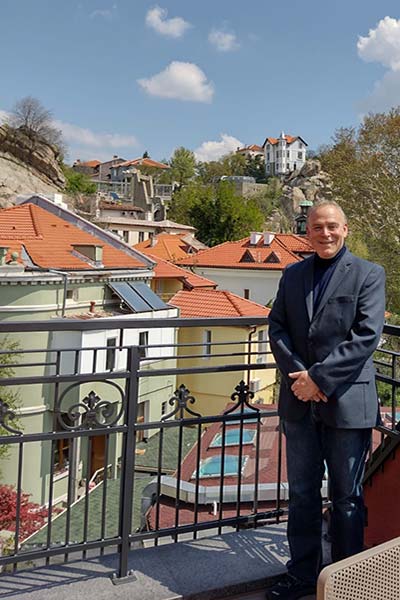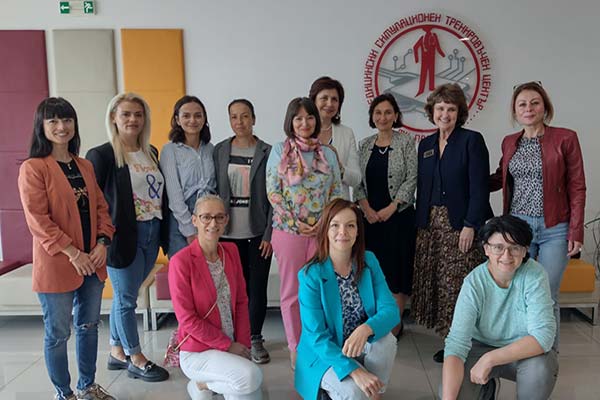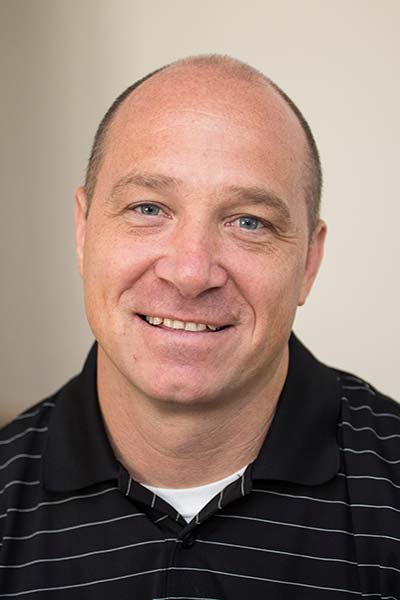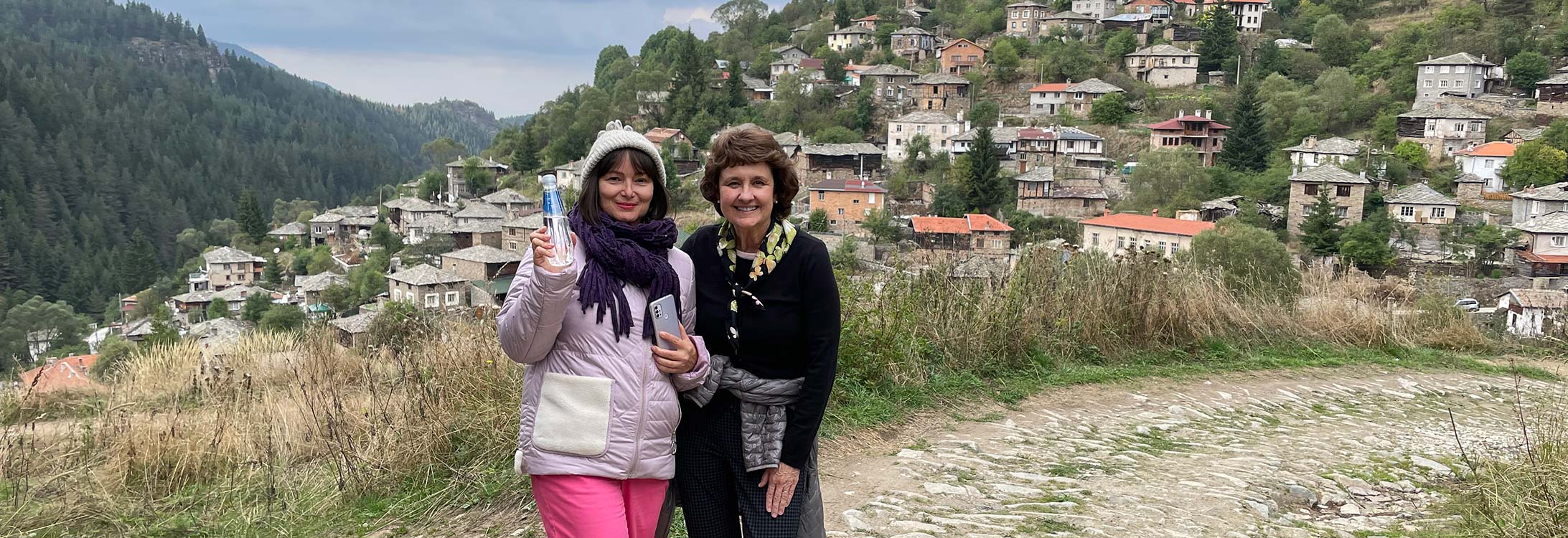BULGARIAN OUTREACH
Allied Health Sciences faculty partner with Bulgarian peers to share best practices
Faculty members from East Carolina University’s College of Allied Health Sciences are expanding the university’s mission of service past the state’s borders — across the Atlantic to the Black Sea country of Bulgaria.

Dr. Robert Orlikoff, the dean of the College of Allied Health Sciences, in Bulgaria.
Over the summer, Dr. Robert Orlikoff, the dean of the college, took his fourth trip to Bulgaria to help faculty members from the Medical University of Plovdiv develop the country’s first medical speech-language pathology program, using an interprofessional collaborative team approach.
“With a decades-long history of preparing therapists in logopedics, professional practice has focused primarily on the communication and special learning problems of children,” Orlikoff said. “Now, in a post-Soviet environment, Bulgaria has experienced a marked decline in its pediatric population, but a substantial increase in the number of older adults, especially those in need of rehabilitative services.”
Over much of October, Dr. Leigh Cellucci, the college’s associate dean for academic affairs and professor of health services and information management, spent time with peers in Plovdiv to share American health care’s best practices for the delivery of allied health services. She also learned how the Bulgarian health delivery methods work for their society, and what successes they have experienced that might translate to the U.S.
“ECU and the Medical University of Plovdiv have much in common. Like ECU, faculty at the medical university focus on educating future health professionals who understand the importance of service and are mindful of cost while working to increase the quality of the care and access to care,” Cellucci said.
Orlikoff and Cellucci both traveled to Bulgaria as part of the European Union’s Erasmus+ program, which builds social, economic and athletic connections between EU member states and non-EU partners, like American educational institutions. Cellucci lauds the Erasmus+ structure for offering students and faculty members an opportunity to see that despite differences of nationality and language, people are much more alike than different.
“We really are stronger in our diversity. There is a different set of assumptions and a different sense of how we view the world, and there’s value in all of our perspectives,” Cellucci said.
History with Bulgaria
Orlikoff was selected as a Fulbright scholar in 2016 and spent time at South-West University in Blagoevgrad, Bulgaria as part of a faculty exchange program. During that initial visit, he lectured through an interpreter to faculty and students on the medical aspects of voice disorders, and how stuttering and articulation challenges are assessed and treated in the American medical system. Bulgarian health care has traditionally considered speech disorders a matter of public health rather than medical conditions, which applies a different focus to treatment.
Before joining ECU, Orlikoff’s first academic appointment was at the University of Memphis. There he enlisted a Bulgarian post-doctoral fellow, Dimitar Deliyski, an engineer in a tech company that developed one of the first, and most influential, computer hardware and software systems used by speech scientists across the globe. Deliyski later joined the faculty of Michigan State University, where he is the chair of the Department of Communicative Sciences and Disorders.
Orlikoff said the personal relationship he built with Deliyski highlighted the need for new ideas and teaching approaches for Bulgarian speech pathologists, which reinvigorated his commitment to maintain connections there.
The Bulgarian medical system is very good at primary care, Orlikoff said, but “much of the medical infrastructure was established during Bulgaria’s time within the Eastern bloc. In many ways it has not developed the interprofessional team approach so crucial to access to quality patient care, support and rehabilitation.”
Bulgarian health care needs
Orlikoff said that Bulgaria and North Carolina share a lot in common, which makes this continuing collaboration meaningful: North Carolina is slightly more populated; the western side of the state is mountainous and the east is boarded by water, just like Bulgaria; and Bulgarian communities are largely in rural and somewhat isolated areas, not unlike regions of eastern North Carolina.
“The rurality,” Orlikoff said, “is what makes it easy to learn and grow from each other’s experiences. In particular, how establishing effective medical care and rehabilitation is key to advancing communities socially and economically.”
Cellucci agrees that eastern North Carolina and Bulgaria share many similarities, but also many of the chronic health conditions — unhealthful food traditions, lack of exercise and spotty access to rehabilitative care — that exacerbate the need of rural, and oftentimes under-resourced, health care services.
“The issues that they’re grappling with are the same ones that we’re grappling with. They are working with their resources just as we are, to make a difference in the lives of the people of their community,” Cellucci said.
Partnership
Orlikoff said that his Bulgarian partners are particularly interested in getting guidance and training from American and Australian partners. Bulgaria is a part of the EU but hasn’t adopted the euro as an official currency. While Plovdiv is the oldest continually occupied city in Europe, many Bulgarians feel like they aren’t well integrated into Europe’s social and medical progress.
“Historically, Bulgaria has been one of the pillars of civilization. The world’s first gold jewelry has been found in Bulgaria within elaborate tombs dating back to the fifth millennium B.C. They have much yet to teach us,” Orlikoff said.
Orlikoff returned to Plovdiv this year to meet with the medical university’s administration and to lecture to medical speech pathology students, a luxury he is rarely afforded as dean of the College of Allied Health Sciences.
“It was wonderful to again teach students about the assessment, treatment and science of voice disorders,” Orlikoff said.

Dr. Leigh Cellucci visits with first year master’s students from the Medical University of Plovdiv.
Cellucci is complimentary of colleague Dobrinka Georgieva, professor in speech language pathology, her host and teaching partner at the Medical University of Plovdiv. Georgieva has traveled twice to ECU to tour and lecture and is committed to bolstering the Bulgarian health care system’s disease prevention and rehabilitation capacities. An internationally recognized expert in stuttering, Georgieva is responsible for most of the effort to establish medical speech pathology in Bulgaria, Cellucci said.
“Speech language pathologists in Bulgaria have private patients. A person who experiences a stroke must pay out of pocket for speech language pathology services,” Cellucci said. “So in a way, they have areas where there’s no coverage, similar to North Carolina for patients who may not have access to health insurance.”
ECU’s physical therapy and occupational therapy students run a free clinic for community members in need. Students in those programs learn how to do their jobs together, because they’ll have to work together after graduation for patient success, an idea that the Medical University of Plovdiv is exploring for its students.
Cellucci said a Bulgarian neurologist she met shares that vision for interprofessional health care delivery, enough so that he’s going back to school to earn a master’s degree in speech language pathology in order to help stroke victims.
Formalizing partnerships

Dr. Jon Rezek, assistant vice chancellor for Global Affairs at East Carolina University.
Dr. Jon Rezek, an ECU professor of economics and ECU’s assistant vice chancellor for global affairs, praised Orlikoff’s long-term partnership with Bulgarian medical educators because ECU’s health sciences faculty have a lot to offer international partners. Collaborations help improve the quality of education at ECU and with partner institutions, he said.
“One of the biggest advantages of maintaining relationships with universities abroad is what we call perspective taking — looking at similar challenges and problems from a different perspective,” Rezek said. “We’re all striving, whether it’s here in eastern North Carolina or rural Bulgaria, to improve standards of living for our populations.”
Rezek stressed that ECU faculty and students recognize social imbalances that can occur when partnering with peers from other cultures. Having new or more expensive facilities and equipment doesn’t always translate to better outcomes.
“We have to make sure they feel like they’re valued in the partnership,” Rezek said. “There is a fine line in those relationships: how do you manage being respectful at the same time as getting across your perspective?”
Cellucci’s expertise is in health care administration — the business end of the medical world. What she hopes to impart to students both in eastern North Carolina and halfway around the globe in Bulgaria is that health care depends upon an effective team. The doctors, nurses and allied health professionals who are the public-facing members of the health care team have to rely on administrators to ensure the whole enterprise is running as efficiently as possible, with the shared goal of the equitable care of every member of a community.
“Regardless of your job, if you are going to be in health care today, you have to get that every patient walking through your door is as deserving of care as anybody else,” Cellucci said. “When you have good health, you have everything. If you don’t have your health, it’s going to impact everything else you want to accomplish in life. That’s true in eastern North Carolina, Bulgaria, or wherever you live that life.”
